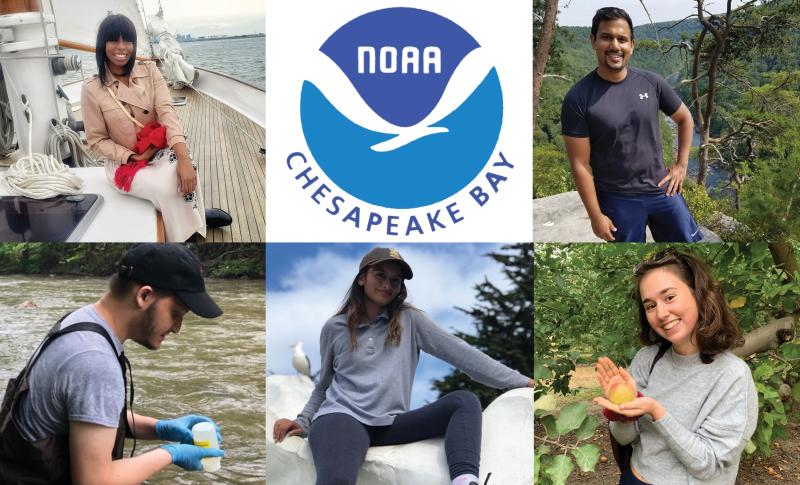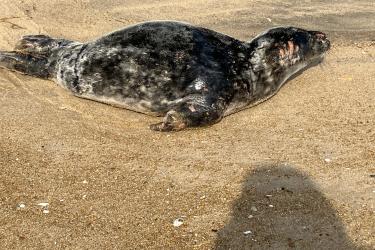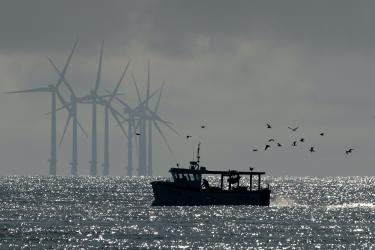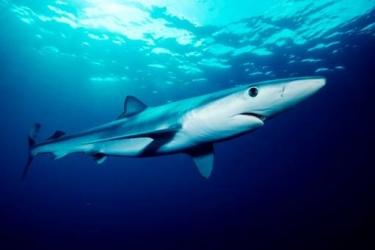Every summer, the NOAA Chesapeake Bay Office offers internships for college students and recent graduates. Interns gain experience while working with NOAA experts, focusing on Chesapeake Bay topics. And, NOAA benefits from having an additional talented person on staff for 12 weeks. Interns often complete stand-alone projects that otherwise would not be able to happen due to time and resource constraints. It’s definitely a win-win!
We partner with the Chesapeake Research Consortium to make these internships possible. Several are through their C-StREAM (Chesapeake Student Recruitment, Early Advisement, and Mentoring) program for students of color and/or who are first-generation college students.
As they were last summer, our internships are virtual this year. But having an identified mentor working closely with each intern ensures that the internship is fruitful, even if it’s from afar. This year, our interns join us from across the country and are diving in to learn more about very different NOAA mission areas.
Travis Gopaul
Travis will be a senior at Salisbury University in Maryland this fall; he is a computer science major. He is serving as our data visualization intern, working with data from the NOAA Chesapeake Bay Interpretive Buoy System.
He decided to explore data science after taking a class in database systems. “We are living in a crucial point in time where technology and data can be used to better the natural world. I'd like to be a part of that,” Travis said.
Travis learned of the opportunity from a NOAA employee who is a member at the YMCA where Travis works during the semester. “I am excited to learn how to apply my study of computer programming to other scientific fields. Being able to work at the NOAA Chesapeake Bay Office allows me to work with environmental data in ways that I hadn't considered before,” he noted.
Travis treasures the Chesapeake Bay—his “home” ecosystem. “The Chesapeake Bay area has always been a part of my life. It's hard to choose one special thing—my dad taught me how to fish at Rock Creek off of the Potomac, I'd go hiking with friends at the Loch Raven Reservoir and Patapsco State Park. I met my wife in Hooper's Island on the Eastern Shore and now we live on the Shore in Easton, Maryland.”
Anissa Foster
Anissa is a rising senior at Stanford University in California; she is studying oceans, atmosphere, and climate. She is our climate change indicator project intern. She is working on conceptual case studies that connect physical change indicators with effects on wildlife and habitats.
She has focused her studies on the intersection of people and technology: “Throughout my Stanford career, I have explored the synthesis of modern technology and ancient ecosystems, utilizing remote sensing, radar and seismology, as well as the knowledge of local people.”
Anissa decided to spend her summer focusing on the Chesapeake because she had heard of work under way there to mitigate and adapt to climate change. “I really believe that it can be a model for the rest of the nation, so I am honored to join the Climate Change Indicators team to further that goal,” she said.
Anissa’s love for natural places runs deep. “I am very excited to expand my work to directly engage with climate change in such a national treasure of a place. As someone raised between the Sierra Mountains, raging rapids, and the Pacific Ocean, it was inevitable that I fell hopelessly in love with this blue planet. Behind my childhood house were rolling hills—the eagles, coyotes, and glittering fish in crystal clear streams have demanded that I dedicate my career to the Earth systems,” she emphasized.
Dlynzee D. Damas
Dlynzee will start her last semester at the University of Massachusetts Boston this fall. She is majoring in environmental science, with a concentration in Earth and hydrologic science and a minor in environmental chemistry. Dlynzee is interning with us this summer, focusing on GIS analysis of Chesapeake seabed data for habitat mapping products.
Dlynzee grew up in Haiti, and she notes that her surroundings there inspired her to go into the environmental field. “I grew up surrounded by nature—the ocean, the mountains, a lot of trees, and all sorts of animals. Majoring in environmental science allows me to explore the relationship between people and the environment,” she said.
She heard about her internships from one of the faculty members at her university, and looks forward to testing what she has learned and to applying her knowledge in the real world. Dlynzee said, “I hope not only to get experiences but also to meet and work with motivated professionals and scientists who are making impacts on environmental and ecosystem conservation.”
Dlynzee appreciates the perspective that some special places bring her: “I love both the ocean and the mountains. But my love for mountains is even greater. Mountains give another perspective of the world. Not only do they provide habitat for plants and animals, or supply fresh water and food, but they are also places where people can find tranquility and calmness. Climbing mountains in the fall is the best time to enjoy the view of the horizon from above.”
Joshua Ramirez
Joshua is attending Harrisburg University in Pennsylvania and will graduate this fall; he is majoring in environmental science and sustainability. Joshua is with us this summer as the sustainable fisheries intern, helping share fisheries and habitat science related to invasive blue catfish.
Because Joshua had pockets of interests in several science disciplines, he was drawn to environmental science because it is interdisciplinary. “Today, as I continue my dive into the field, I maintain my inspiration simply by knowing that my actions, no matter the scale, can help grow our knowledge, and conserve both species and ecosystem functions and services,” he said.
Because he will be entering his final semester, Joshua wanted to be sure to seize the opportunity to gain real-world experience through a position this summer. He found a link to our internships just two days before the deadline, but managed to get all the documents filled out and reference letters in time.
Around Harrisburg, Joshua enjoys time on the Greenbelt Trail. “I pass by chilling groundhogs when I ride my bike. In many instances, other species tend to move from the trail in response to incoming people or bikes (like little birds, geese), yet the groundhog sits right next to the trail even as I pass. But when I get off my bike 10 meters away to snap a picture, it runs! I always laugh when that happens. Since the groundhog is the one species I have seen not react suddenly, I call them ‘chilly.’”
Hannah Chamberlain
Hannah is a junior at Indiana University, where she is majoring in environment and sustainability studies. She is with us this summer as the environmental literacy intern. She is creating resources for the Bay Backpack website and helping to plan and implement training sessions for educators at the NOAA Environmental Science Training Center.
Hannah is eager to learn more about environmental education work around the country. She heard about the internship via LinkedIn and an online environmental job website. Looking to her future, she notes that “I hope this gives me some insight into potential job opportunities I could pursue in the future.”
She has been passionate about the environment since she was little, and remembers making donations to environmental organizations when she was a child. “Since then I have developed a real interest in education and recognizing inequalities that exist within the current American education system as well. I think the overlap of environmental activism and education is so important to teach students from a young age to respect the environment and know when it is not healthy in order to create a generation of active environmentalists,” she said.
Hannah is inspired by the nature around her: “Waking up to the birds singing is one of my favorite things about my home ecosystem in southeastern Massachusetts. It seems so simple and could easily be dismissed but it is one of those things that reminds me of just how beautiful every moment can be, thanks to nature.”
NOAA’s North Atlantic Regional Team Interns
Our colleagues at the NOAA North Atlantic Regional Team are hosting two interns through our partnership with the Chesapeake Research Consortium this summer, too. Both interns are serving as satellite data interns. They are helping to develop a project in Virginia’s Middle Peninsula (between the Rappahannock and York rivers) that will deliver data from satellites to decision makers.
Olivia Fey
Olivia will start her junior year at Swarthmore College this fall. She’s creating her own major that will combine environmental science, technology, and sustainability. She is minoring in applied mathematics. Her goal this summer was to work on environmental issues her in home town, so she looked for opportunities that would let her focus on water quality in the Chesapeake Bay area, especially with NOAA.
“I really want to gain exposure to satellite-derived data and remote sensing so I can boost the technology portion of my major and explore more intersections between the environment and technology,” Olivia noted. “I also want to develop stronger communication skills, because conveying the importance of your work in a meaningful ways is as important as technical skills.”
Olivia’s connection with the natural world has been part of who she is since she was young. As a child she participated in releasing diamondback terrapins back into the wild, but one swam right into a plastic bag. “That was really disturbing for me having raised these turtles in school for months, and was really symbolic of the importance of treating the Earth right.”
Rachel Lazzaro
Rachel is a senior at Temple University, where she is pursuing a double major in environmental science and computer science and minors in public health and chemistry. A friend alerted her to the internship opportunity at the North Atlantic Regional Team, and Rachel was eager to apply as it combines large-scale human impacts with the opportunity to gain skills in geospatial data processing.
“Understanding the connection between environmental justice and public health is something that I am passionate about,” Rachel said. “This internship with NOAA has been an incredible opportunity for hands-on work in achieving environmental equity.”
Rachel’s upbringing in rural Pennsylvania fueled her connection with nature. Some of her favorite memories are of visits to Hawk Mountain, a raptor conservation sanctuary in the Appalachian Mountains. “Through family hikes (where my siblings and I would excitedly point out any red-tailed hawks circling above), I developed an appreciation and interest in my local ecosystem and a passion for conservation biology that has led me to where I am today,” she said.










